What to do with its batteries and batteries?
Published on 07/4/2014
A recent study shows that on average, the French have at home 75 cells or batteries which a part is used. It is about 3 kg of batteries and accumulators stored by each french household. This practice is counter-productive since the collection makes it possible to recycle 50% to 70% of the weight of the waste.
To reduce your waste prefer rechargeable batteries instead of batteries disposable. (see article 06/19/2014 blog how to make savings on your purchases of batteries)
Rejected without precaution, batteries and accumulators can release into the environment of many dangerous compounds: acid, lead, aluminium, lithium, mercury.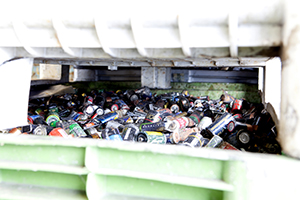 Since January 1, 2001, the collection of batteries and accumulators is compulsory, regardless of their type, even if all are not classified as hazardous waste. Are considered hazardous waste:
Since January 1, 2001, the collection of batteries and accumulators is compulsory, regardless of their type, even if all are not classified as hazardous waste. Are considered hazardous waste:
- (mostly used as the car starter batteries) lead-acid batteries,
- batteries Nickel - cadmium (Ni-Cd), (more and more replaced the Ni-Mh batteries).
- batteries containing mercury (button cells)
- electrolyte from batteries and accumulators.
On the other hand, the batteries saline and alkaline waste are not considered as hazardous waste but is not a reason for not recycling.
Never throw batteries, batteries or accumulators in your regular trash. Use the collection points installed in over 20 000 sites in France, mainly in the retail, specialized shops, DIY stores and local communities. Thanks to the two largest companies of collection and recovery of cells and batteries, Screlec and Corepile, you will always find a bin near you.
![]() Click here to know the nearest collection point, from our partner Corepile.
Click here to know the nearest collection point, from our partner Corepile.
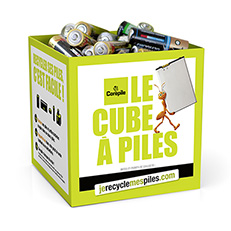 You can group your batteries and small batteries, at home, in the cube to batteries of Corepile. Let us an application by the contact form specifying the number of boxes.
You can group your batteries and small batteries, at home, in the cube to batteries of Corepile. Let us an application by the contact form specifying the number of boxes.
At the end of a neat sort directed by Corepile, used goods are grouped into batches based on technologies. The processing centre then retrieves the metals that make up in order to reintegrate them into the production chain. The treatment of cells and small batteries collected by Corepile allows to recover about 5,000 tons of metals annually.
These metals are then reused for making objects of everyday life as of the gutters in zinc, stainless steel cutlery, with bollards, hardware, car plate, hulls of ships or new batteries (nickel) or compounds for photovoltaic panels (Cadmium).
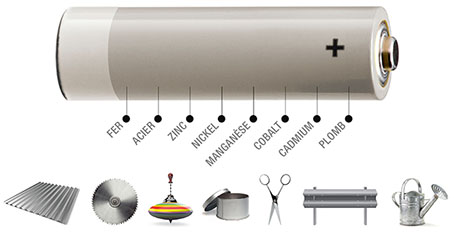
The recycling of batteries and accumulators appealed to 4 types of processes:
THE PYROMETALLURGY
Batteries and rechargeable batteries: batteries alkaline/salt, Lithium batteries, rechargeable batteries NiCd, Li-ion, NiMH
Batteries or rechargeable batteries are introduced into a furnace. The separation of metals is achieved by a redox reaction. The fractions will be different from one factory to another and adapt to the needs of the market.
HYDROMETALLURGY
Batteries and rechargeable batteries: batteries alkaline/salines, rechargeable batteries NiCd, Li-ion
Batteries and accumulators undergo physical treatment leading to the separation of ferrous, non-ferrous compounds and paper/plastics.
The non-ferrous fraction is then subject to acid physico-chemical treatment, to separate the elements. This methodology would like its name from the use of acid liquid for treatment.
THE DISTILLATION
Batteries and rechargeable batteries: button cell batteries
The batteries first undergo a cryogenic grinding in liquid nitrogen to prevent vaporization of mercury (coin older generation). Got amalgam will then undergo distillation. The metallic elements separated by magnetic means.
THE MERGER
Batteries and rechargeable batteries: lead-acid Batteries
The process is comparable to that of the pyrometallurgical process but gives only a matter in out of oven: lead ingots
Post related products
-
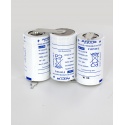
Batterie Ni-Cd 3,6V 4Ah 3VTD-CC Clip BAES (131607N) 131607
-
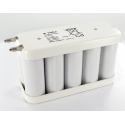
Batterie Ni-Cd 12V 8Ah 10VREFL Flasques Arts (804604) 804604
-
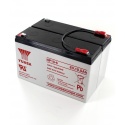
Batterie Plomb 12V 10Ah Yuasa (151X98X98) (NP1012) NP1012
-
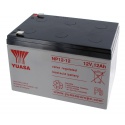
Batterie Plomb 12V 12Ah Yuasa (151X98X98) F2 (NP12-12) NP12-12
-
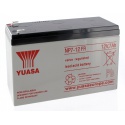
Batterie Plomb 12V 7Ah Yuasa (151X65X98) (NP7-12FR) NP7-12FR
-
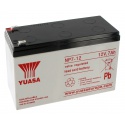
Batterie Plomb 12V 7Ah Yuasa (151X65X98) F1 (NP7-12) NP7-12
-
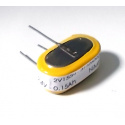
Batterie Ni-Mh 2.4V 150mAh 3 Picots Varta microbattery (2V150H) 2/V150H
-
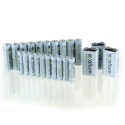
LOT DE PILES X10 AA LR6 + X10 AAA LR3 + X3 6LR61 9V EXALIUM LR3-LR6-6LR61-EXA
-
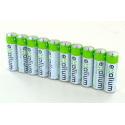
10 piles LR06 AA 1.5V Alcalines EXALIUM 10-LR06EXA
-
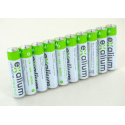
10 PILES LR03 AAA 1.5V ALCALINES EXALIUM 10-LR03EXA
-
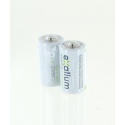
2 Piles LR14 C 1.5V Alcalines EXALIUM (LR14EXA-S2) LR14EXA-S2
-
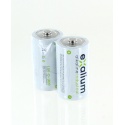
2 Piles LR20 D 1.5V Alcalines EXALIUM LR20EXA-S2
-
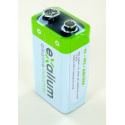
Pile Alcaline Exalium Industrial 6LR61 9V 6LR61EXA
Express delivery
- By carrier or
- By Postal Service
Professional Quality
Secured Payment
Search in Blog
Par Mustapha B. (VALBONNE, France métropolitaine) le 14 Oct. 2025 :
Par Willfred H. (Butjadingen, Germany) le 11 Oct. 2025 :
Par Derry P. (Cranves-Sales, France métropolitaine) le 30 Sept. 2025 :






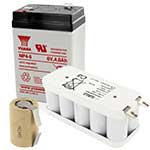
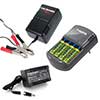
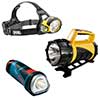
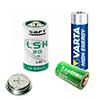



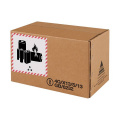


COMMENTS
No customer comments for the moment.